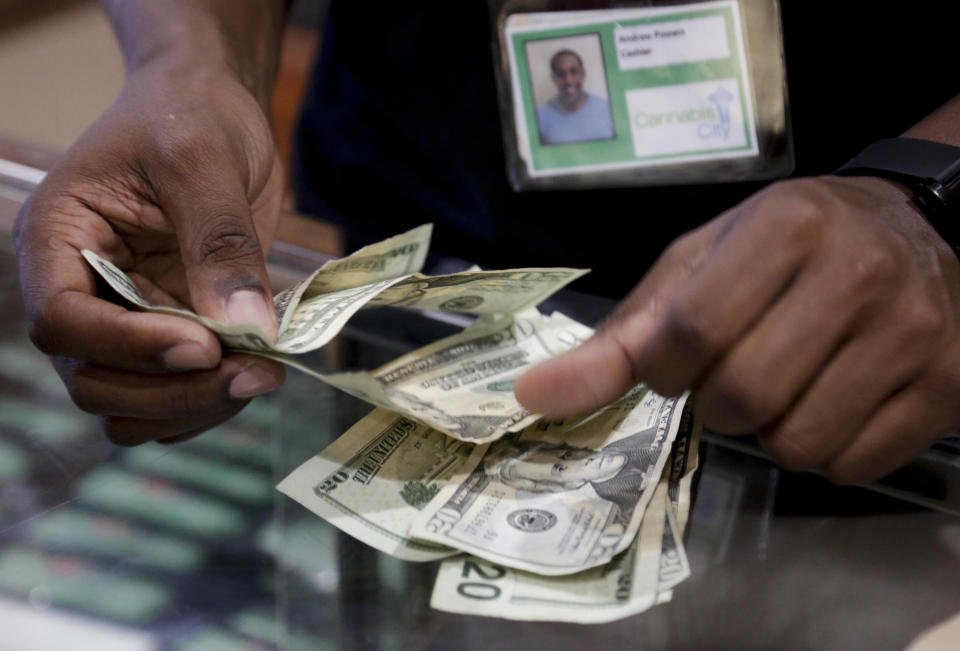'Let's fix this': Congress is trying to solve the marijuana industry's banking problem

The U.S. cannabis industry moved one step closer to gaining access to banking services Tuesday as the Senate held its first committee hearing on a bipartisan bill to protect banks from cannabis-related penalties.
While the measure has received some pushback, it also has support on both sides of the aisle, largely based on the hypothesis that access to financial services would reduce public safety risks for cannabis companies, many of which have to deal in all-cash because banks won’t serve them.
The bill has also received support because it could in theory allow for proper taxation of revenue and streamline transactions with non-cannabis companies.
“There’s nothing good about forcing the cannabis industry to operate in cash,” Sen. Jeff Merkley (D-OR), one of the bill’s sponsors, said at the hearing. “Let’s fix this.”
‘A dramatic shift in Americans’ views’
Near the end of the hearing, the Senate banking committee’s chair, Mike Crapo, (R-ID) acknowledged that testifying witnesses had made strong cases to resolve banking issues related to cannabis, including problems that legacy cash poses for combating illegal cannabis transactions.
Brady Cobb a former cannabis industry lobbyist, who now serves as CEO of the cannabis investment firm SOL Global, told Yahoo Finance that a lot of work remains to be done to legalize cannabis banking transactions, though the hearing resulted in forward movement.

“It was great to hear all the [committee] members acknowledge the need for banking, even the ones that may oppose cannabis,” he said. “Sen. Mike Crapo saying there is a strong case for cannabis banking to be fixed is one of the clearest statements of intent to date, and for it to come from the chair of Senate Banking shows how seriously this reform is being taken.” Cobb said he’s been tapped to testify in a subsequent congressional hearing on the issue, at a date yet to be determined.
Members of the Senate’s Committee on Banking, Housing and Urban Affairs heard testimony from witnesses and listened to statements from the SAFE Act’s cosponsors, Senator Cory Gardner (R-CO) and Merkley, who reintroduced the proposed legislation in April. The Act trails a House version that passed out of committee in March.
Witnesses and senators overwhelmingly expressed a need for the industry to introduce banking services in order to serve the will of voters in states that have legalized marijuana use.
“There has been a dramatic shift in Americans’ views of cannabis in recent years,” Gardner, who was once opposed to legalization, said. “Polling shows that about 65% of Americans support legalization of marijuana. 93% support medical marijuana. In fact, majorities of both parties support legalization.”
Witness Rachel Pross, chief risk officer of Oregon’s Maps Credit Union, told the committee that her credit union’s board elected to serve cannabis business clients, despite the federal designation that makes their money transactions illegal.
“There are there are certainly valid concerns being brought to this committee hearing today. But the SAFE Banking Act is narrowly targeted,” she said. “It's a narrowly targeted protection for financial institutions to serve an $8.3 billion industry is already in place today.”
Is a marijuana banking bill ‘premature?’
In early June, Merkley told Yahoo Finance that the Senate version of the SAFE Act had gained 31 sponsors and was gradually building steam. Cobb, who has worked on cannabis legislation with senators who serve on the Senate Financial Services Committee as well as the Senate Judiciary Committee, said support remains approximately the same today.
Cobb said after years of working to convince Republican members of Congress to support cannabis-related regulation, he now is tasked with trying to convince liberal members of the Democratic caucus to take baby steps on legislation. In particular, he urges lawmakers to avoid tacking on social justice and other issues to the current bills under consideration.

“It's so bizarre to me that after fighting to turn Republicans for two to three years on this issue, now they're kind of in lockstep, and I gotta go back, and now I'm going to the Democratic side of the of the hallways going ‘Come on, we’ve got em here, what are you doing?’”
One witness who testified Tuesday suggested that it’s irresponsible to prioritize marijuana business banking laws over science that verifies risk factors associated with marijuana consumption.
“To address banking, and the institutional investors entering the banking system to invest in marijuana firms, is premature before we've had a debate over whether or how to regulate the addictive potential, the abuse potential of high-potency marijuana,” said Garth Van Meter, vice president of government affairs for Smart Approaches to Marijuana, which is opposed to the commercialization of marijuana. Van Meter criticized the SAFE Act as tailored to favor multinational corporations, major investment firms, hedge funds, pension funds, at the expense of smaller industry players and end users.
Today’s marijuana, he said, is produced in concentrations that have damaging effects on the brain, are promoted by the industry, and sold in forms attractive to children. He singled out high-concentration THC “shatter” previously marketed by Acreage Holdings, Inc. (ACRGF) under a marijuana strain named "Thin Mint Girl Scout Cookies," as well as brightly colored, sugar-coated marijuana gummies that he said may appeal to children.
“We think that legalization in America equals commercialization, and there isn't really a way to stop that,” Van Meter said. “And so, from that standpoint, I think there is a benefit to keeping marijuana federally illegal.”
Alexis Keenan is a New York-based reporter for Yahoo Finance and former litigation attorney.
Follow Alexis Keenan on Twitter @alexiskweed.
Read more from Alexis:
One CEO says he has ‘solved the elbow wars’ on passenger airplanes
‘I’m outraged at Boeing’: Why pilots are suing over the 737 Max
These kids ‘never consented’: Why Boeing is being sued over Alexa recordings
Follow Yahoo Finance on Twitter, Facebook, Instagram, Flipboard, SmartNews, LinkedIn,YouTube, and reddit.

